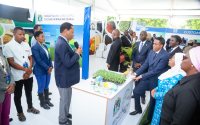National Plant Genetic Resources Centre (NPGRC) in Arusha, Tanzania: Safeguarding Tanzania’s Agricultural Future
In Arusha, Tanzania, lies a hidden gem that plays a crucial role in ensuring the nation’s food security and agricultural development – the National Plant Genetic Resources Centre (NPGRC). Established in 1990 and affiliated with the Tanzania Agricultural Research Institute (TARI), the NPGRC is a government agency with a mission that resonates with the core needs of Tanzania’s agricultural landscape: conserving, managing, and sustainably utilizing plant genetic resources for food and agriculture (PGRFA). The center’s work is instrumental in optimizing these resources to contribute significantly to national development goals.
At its core, the NPGRC focuses on four main functions:
Collecting, Conserving, and Evaluating Plant Genetic Resources: The NPGRC’s dedicated team collects plant genetic resources from diverse sources across Tanzania, including farmers’ fields, forests, and other natural areas. These resources, comprising a rich array of crop varieties, wild relatives of crops, and other valuable plants, are then meticulously conserved and evaluated. This evaluation considers essential traits such as agronomic performance, resistance to pests and diseases, and adaptability to environmental conditions.
Distributing Plant Genetic Resources: The NPGRC serves as a vital hub for researchers, breeders, and other users by distributing plant genetic resources. These resources are essential for the development of new crop varieties that can enhance agricultural productivity and resilience in the face of climate change and emerging pests and diseases.
Conducting Research on Plant Genetic Resources: Research is at the heart of the NPGRC’s activities. The center conducts vital research on various aspects of plant genetic resources, including methods for conservation, germplasm evaluation, and crop improvement. This research is critical for developing innovative agricultural solutions and improving the quality of crops in Tanzania.
Raising Awareness and Promoting Sustainable Use: Recognizing the importance of educating the public and stakeholders, the NPGRC actively raises awareness about the significance of plant genetic resources and advocates for their sustainable use. These resources are the building blocks of agriculture, and their conservation and responsible utilization are pivotal for long-term food security and environmental sustainability.
The NPGRC’s dedication to its mission is evident through its extensive collection of over 18,000 accessions of PGRFA, including major food crops, horticultural crops, forage crops, and indigenous wild food plants. This collection is stored in secure, environmentally controlled environments, including a long-term seed bank, where the seeds are preserved at low temperatures and humidity to ensure their viability for many years.
Moreover, the NPGRC is not an isolated entity but actively participates in national and international initiatives. It is a member of the Global System for Conservation and Use of Plant Genetic Resources for Food and Agriculture (SINGER) and a Contracting Party to the International Treaty on Plant Genetic Resources for Food and Agriculture (ITPGRFA). Collaborations with various national and international organizations further strengthen its efforts in plant genetic resources conservation and management.
The NPGRC’s contributions extend far beyond the boundaries of Tanzania. Its work supports agricultural research, innovation, and sustainable farming practices, ultimately benefiting not only the nation but also the global community. The center’s dedication ensures that Tanzania’s plant genetic resources remain a valuable asset, capable of addressing the challenges of the present and future, such as food security, agricultural development, climate change resilience, and environmental sustainability.


